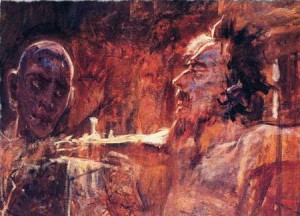What is the difference between “the good thief” and “the bad thief” on the cross? The answer can be found in asking who is their king? There is a great similarity between them, for both were thieves and presumably not very good at it, as they got caught.
Roman citizens could not be crucified, so neither of them were Roman citizens and slaves were punished by crucifixion for stealing, so it is possible they were both slaves who had stolen. However, if you want to see what separates the two it is their attitude toward the Kingdom of God. This attitude is something we need to reflect on, but it shows that we ourselves can follow one example or the other.
What drastically separates the two is their concept of who is their king.
The bad thief on the cross does not acknowledge a king and if you look carefully at his words, he is manipulative and unrepentant. It is not just that he chides Jesus, as much as, he is someone whose words reflect extreme self-centeredness. It is clear that he wants off the cross, who wouldn’t, but it is not clear that he has no intention of stealing again. He seems to see himself as his own boss. Get him off the cross and he will go back to his life and find more victims.
The good thief has a huge change of heart and he does what the others and those who crucified Jesus do not, he repents and acknowledges Jesus as His king.
At our bible study this week with other priests, one priest pointed out that the term paradise comes from the Persians and it means “The King’s Garden”. So Jesus is literally bringing the good thief into his garden, into his home in a sense, into his inner circle. All he did was repent of his sin and acknowledge Jesus as king.
Notice two things: We can be as successful as the high priest, or as unsuccessful as the bad thief, it does not matter, if we do not acknowledge or recognize the king, then we do not enter His kingdom. However, the reverse is also true. We can be as successful as Zaccheus the Tax Collector or as unsuccessful as the good thief if we do recognize the king and become subject to his authority, then we enter into his kingdom.
It is a simple reality. Yet, it is literally the difference between Heaven and Hell. The person who seeks to be a subject of the King finds Heaven, and the person who obstinately refuses to the end to be a subject of the king finds hell. There is no ultimate middle ground.
Yet, that makes sense, for it is God’s kingdom and we have a choice to be a part of it or not. The choice is something we are called to make every day of our lives, asking to not only be a member of the kingdom, but a subject of it where we seek to do his will everyday and seek to know what it is he wants of us everyday.
The problem becomes in understanding that the default is to be excluded from the Kingdom. This is why Jesus comes and saves us, so that we become the exception to the default. We need only seek his salvation and we are liberated from the default.
Look at it this way, you are on a sinking ship in the North Atlantic. You can either get into the lifeboat and find life or you can remain on the ship and listen to nobody. The default is you die in the frigid waters of the North Atlantic. So getting into the provided lifeboat is what saves you. However, if you obstinately refuse to do that, then you have no choice but to suffer the default.
This is the difference between Heaven and Hell. Simply choosing to be a subject to the Kingdom of God by seeking to do God through prayer and the sacraments and a life reflecting our citizenship saves us from the default which is eternal damnation. It is relatively simple, but intensely important to understand the difference.
The good thief on the cross repents, acknowledges Christ as his savior and enters in the King’s garden and salvation for eternity. The other has the unique distinction of being one of the two people to whom Jesus never responded.
They were both thieves and most likely slaves, but one discovered the Kingdom of God and the other rejected it. How about you?
What is your attitude toward the King. Are you going through the motions expecting that the King will accept you, or are you taking an active role in choosing the Kingdom of God and in being one of His subjects. The choice is yours, the difference is literally between salvation and perdition. Let us always choose to be the King’s subjects and lead others to make that choice away from the default into salvation.
God bless you,
Fr. Robert J Carr
Fr. Carr is an alliance member of the New Song Community (Canção Nova). He is the pastor ofHoly Trinity Parish, Quincy, MA and is the editor of this blog. He also has a regular radio program on WebRadio Canção Nova. Which he podcasts on the Canção Nova podcast website and here on Catholicismanew.
You can follow him on twitter as @frbobcarr. Thoughts, comments on the homily? Let us know at Facebook


